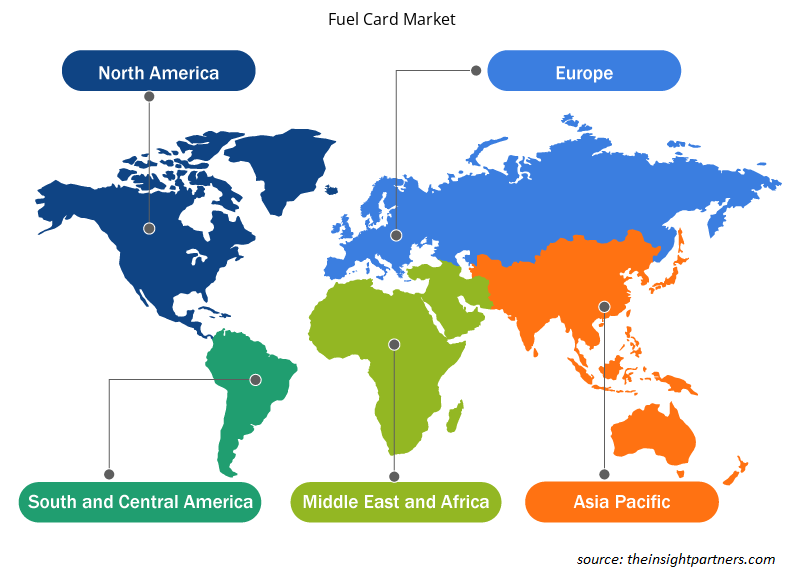The North America region commands a significant market share in terms of revenue generated for fuel card and it is estimated that it will continue to dominate the market share through-out the forecast period. Universal cards are the most convenient fuel card type, the providers of these cards usually partner with several fuel companies and offer great flexibility. Certain fuel card companies merely operate in some countries or regions while others may only be accepted at particular fuel stations. Users with less options in their region may need to be cautious regarding limiting them to just a few fuel stations.
Fuel cards enable enhanced tracking of fleet expenses and efficiency of the fleet by tracking real-time mileage and fuel usage by vehicles in a fleet. Fleet operators use fuel cards for costs such as truck maintenance, truck repairs, fuel, truck cleaning, and replacement vehicle rental, among others. Data captured by a fuel card include odometer reading, fuel grades, fuel product, and quantity of fuel, vehicle ID, driver ID and tax information along with transaction details such as time, location, spend amount and date support rich repowering for fleet managers. This factor would be propelling the demand of fuel card market in the forecast period.
Fuel card usage offers benefits in terms of functionality and security when compared to alternative methods of payment for fuel such as petty cash. Cards can be imprinted with the vehicle registration number or driver’s name and the company name providing further protection against fraudulent usage or cards for refueling. Comprehensive information on all fuel dealings reduces the prospective for employee misuse and offers superior control over authentic vehicle usage. Therefore, the fuel card market across the globe is anticipated to grow.
The fuel card market by component is segmented into branded fuel cards, merchant fuel cards, and universal fuel cards. Fuel cards are usually used by SMEs and large business to track their fuel consumption and make convenient make cashless payment. Such cards are most common for the business or organizations which deals into transportation and fleet management. Different companies operating in the space offer different card type. These cards apart from refilling fuels are used for several other purpose. Fuel card by issuer can be broadly categories independent or branded.
The global fuel card market based on application has been segmented into fuel refill, parking, vehicle service, toll charge, and others. A fuel card enables users’ as well as business owners to manage and control fuel and maintenance expenses. They are generally used as a payment card for fuels at petrol stations. Moreover, these cards can also be used for payment of other vehicle services such as repairs, maintenance as well as roadside assistance. Owing to broad reporting, several fuel cards enable users to obtain real time reports, thus, helping them to stay up-to-date of all business expenses along with managing vehicle taxes.
The regional trends and factors influencing the Fuel Card Market throughout the forecast period have been thoroughly explained by the analysts at Insight Partners. This section also discusses Fuel Card Market segments and geography across North America, Europe, Asia Pacific, Middle East and Africa, and South and Central America.

| Report Attribute | Details |
|---|---|
| Market size in 2018 | US$ 6.29 Billion |
| Market Size by 2027 | US$ 10.39 Billion |
| Global CAGR (2018 - 2027) | 5.8% |
| Historical Data | 2016-2017 |
| Forecast period | 2019-2027 |
| Segments Covered |
By Type
|
| Regions and Countries Covered | North America
|
| Market leaders and key company profiles |
The Fuel Card Market market is growing rapidly, driven by increasing end-user demand due to factors such as evolving consumer preferences, technological advancements, and greater awareness of the product's benefits. As demand rises, businesses are expanding their offerings, innovating to meet consumer needs, and capitalizing on emerging trends, which further fuels market growth.
Market players density refers to the distribution of firms or companies operating within a particular market or industry. It indicates how many competitors (market players) are present in a given market space relative to its size or total market value.
Major Companies operating in the Fuel Card Market are:
Disclaimer: The companies listed above are not ranked in any particular order.
Some of the market initiatives were observed to be most adopted strategy in the global fuel card market. Few of the recent market initiatives are listed below:
2019:Edenred Capital Partners invests in innovative businesses with high growth potential in areas related to Edenred's activities. The aim is to enhance the Group's ecosystem by initiating valuable synergies with the companies backed.
2018:Edenred, the world leader in transactional solutions for companies, employees and merchants, today announced the signing of an agreement to acquire 80% of the share capital of The Right Fuelcard Company (TRFC) group, the number four fuel card program manager in the United Kingdom.
Allstar, Arco, Caltex , Chevron Texaco, Commdel, EDC, Engen Petroleum Ltd., FastFuel, Fleetcare Pty Ltd, fuelGenie, and Fuelman are few other market players from value chain which are not profiled in the report but the can be included based on request.
The List of Companies